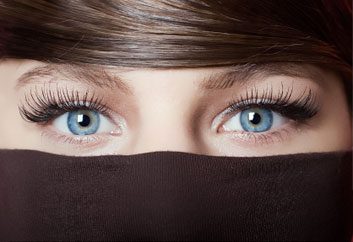News: Could Big Brother make you healthier?
According to a study described on the Scientific American website, it’s not just when your mother’s watching that you pick

According to a study described on the Scientific American website, it’s not just when your mother’s watching that you pick up after yourself better’all it takes is an image of a pair of human eyes.
Researchers at Newcastle University performed the experiment in their own cafeteria, observing people’s behaviour after eating (putting their dishes away or leaving a mess behind and hoping nobody noticed). The catch? They hung a variety of art in random places in the cafeteria, at eye level, throughout the study period. And when that art was a pair of eyes, people were twice as likely to clean up after themselves as when only pictures of flowers were hung.
The idea is that we’re hard-wired to conform to social conventions when we’re being observed’but when no one’s watching, it’s only human to try and get away with the lazy way out. And it made me recall some thoughts that went through my head last weekend, as I was running a 10K race here in Toronto. I had signed up for real-time race alerts on my progress to be posted directly to my Facebook account, and as I hit the hard part of the race, around the 7K mark, and was thinking of how easy it would be to just stop running, I remembered that my Facebook friends were watching me’and that my final time would be posted for them all to see. It wasn’t my only motivation that day, but it was certainly a contributing factor’and in fact, I ran a personal best.
Similar conventions govern a whole host of healthy and unhealthy habits’and they’ve been changing over the years. Older colleagues tell me of how it used to be unusual and even frowned upon to eat at one’s desk at work, or for there to be snacks in the breakroom, or even snacking at all. In some cultures, eating or drinking while walking is frowned upon. And who wants to be first to the buffet table? Taboos around eating have in the past helped us moderate our natural biological behaviour, which is to stuff as many calories as possible into our bodies, to save up for the next famine. It seems that a lot of these taboos are disappearing, meaning that we see it as okay to eat anytime, anywhere. And the more places we have to eat or find food, the more we’ll eat.
The question is, can we evolve these cultural conventions toward favouring healthier behaviours, like regular exercise and moderation in portions? And could the easiest answer to too much nighttime snacking be a pair of eyes posted on your fridge door? How do cultural taboos and approval moderate your approach to health?
Related:
‘ 10 ways to be more active on the weekends
‘ 5 ways to follow through on your goals
‘ 14 ways to make your fitness goals stick




